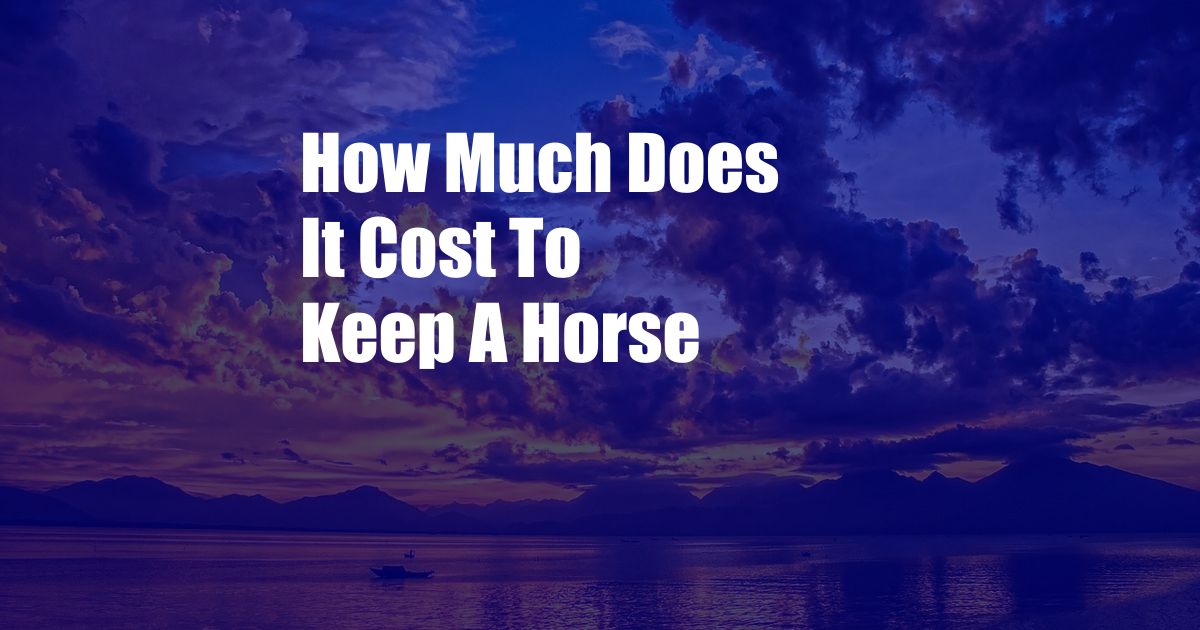
How Much Does It Cost to Keep a Horse?
Owning a horse is a rewarding yet demanding experience. While the initial purchase price of a horse can vary significantly, it’s equally crucial to consider the ongoing costs associated with their upkeep. This comprehensive guide will delve into the financial implications of owning a horse, providing a detailed breakdown of all the expenses involved.
Depending on the breed, age, and health of the horse, the initial cost of purchasing one can range from a few thousand dollars to tens of thousands of dollars. However, it’s important to remember that this is just the beginning of the financial commitment.
Monthly Expenses
Once you have your horse, you’ll need to factor in the monthly expenses that come with its care. These include:
- Housing: Boarding your horse at a stable can cost anywhere from $200 to $1,000 per month, depending on the facilities and amenities offered.
- Feed: The average horse consumes approximately 15-20 pounds of hay and 5-10 pounds of grain per day. Depending on the quality and type of feed, this can cost between $100 and $200 per month.
- Veterinary care: Routine veterinary visits, vaccinations, and deworming can add up to $200-$500 per year. Additionally, unexpected medical expenses can be significant.
- Farrier: Regular hoof trimming and shoeing are essential for maintaining a horse’s health and well-being. The cost can vary depending on the frequency and the farrier’s fees, but typically ranges from $50-$150 per month.
- Insurance: Equine insurance can help cover the costs of medical expenses, loss of use, and liability. Premiums vary depending on the coverage and the horse’s value, but typically fall between $30-$100 per month.
In addition to these monthly expenses, horse owners should also budget for occasional costs such as:
- Tack and equipment: Saddles, bridles, and other essential equipment can range from a few hundred to several thousand dollars.
- Training: If you plan on riding your horse, professional training can enhance your experience and safety. Training costs can vary depending on the type of training and the trainer’s fees.
- Transportation: If you don’t have a trailer to transport your horse, you’ll need to hire a professional. The cost of transportation can vary depending on the distance and availability of services.
Tips for Saving Money
While the cost of owning a horse can be significant, there are ways to save money without compromising the animal’s well-being.
Consider the following tips:
- Negotiate boarding costs: Talk to the stable owner about potential discounts for long-term stays or multiple horses.
- Buy hay and feed in bulk: Purchasing larger quantities can save you money in the long run.
- Learn basic hoof care: With proper training, you can perform basic hoof trimming yourself, saving on farrier costs.
- Explore DIY options: If you’re handy, you can build your own tack or equipment to save money.
- Share costs with other horse owners: Consider pooling resources with other horse enthusiasts to share expenses for training, transportation, or veterinary care.
FAQs
Q: What is the average monthly cost of owning a horse?
A: The monthly cost can range from $500 to $1,200, depending on the size, health, and lifestyle of the horse.
Q: What are the most expensive aspects of horse ownership?
A: Veterinary care, housing, and feed typically account for the majority of the expenses.
Q: Can I own a horse on a budget?
A: While owning a horse is not typically considered a budget-friendly endeavor, there are ways to save money with careful planning and by considering shared ownership options.
Conclusion
Owning a horse is a rewarding yet substantial financial commitment. By understanding the costs involved and exploring ways to save money, you can ensure that you provide your horse with the best possible care while managing your expenses effectively.
Are you interested in learning more about the expenses associated with horse ownership? Connect with other horse enthusiasts and share your experiences in the comments section below.